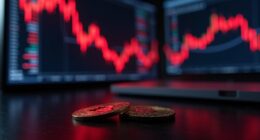In an era where reckless fiscal policies have ballooned global debt to unprecedented and unsustainable heights, Robert Kiyosaki’s blunt admonition to pivot aggressively toward Bitcoin is less a prediction and more a demand for urgent financial accountability, exposing the wilful blindness of those clinging to fiat illusions while the looming economic implosion threatens to obliterate conventional wealth paradigms. The total global debt, swollen by pandemic-induced spending sprees, now teeters on the brink of collapse, with analysts warning that the ensuing crisis will dwarf previous financial catastrophes. Kiyosaki’s stark forecasts of the “biggest stock market crash in history” and a protracted economic depression are rooted not in alarmism but in the cold arithmetic of debt overload and inevitable currency devaluation, which fiat-dependent economies stubbornly refuse to confront. Numerous economists and analysts have raised concerns about the unsustainable global debt levels that threaten systemic financial stability.
Bitcoin, in Kiyosaki’s view, emerges not as a speculative gamble but as a calculated refuge against the terminal weaknesses of current monetary systems, its decentralized architecture and capped supply rendering it impervious to the inflationary decay that will ravage traditional currencies. Advocating for a diversified portfolio inclusive of Bitcoin, gold, and silver, Kiyosaki underscores the critical necessity of hedging one’s assets before the financial tectonics shift catastrophically. His bold price projections—Bitcoin soaring to $180,000 or more by 2025—may invite skepticism, yet they reflect fundamental supply-demand dynamics intensified by impending halving events. Many investors also consider altcoins’ innovations as complementary opportunities, though they require careful scrutiny due to their inherent risks.
Dismissive attitudes toward such warnings betray a dangerous complacency, one that Kiyosaki challenges head-on, urging proactive wealth defense through financial education and tangible investments rather than reliance on fragile fiat instruments. In the face of an inevitable systemic reset, his message is clear: adapt swiftly or be irretrievably consumed by the fallout of fiscal irresponsibility.









